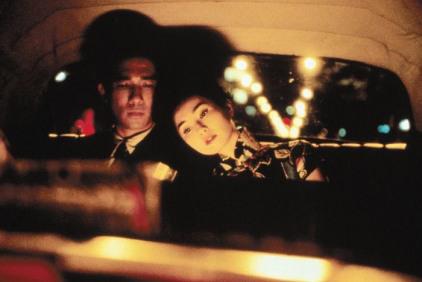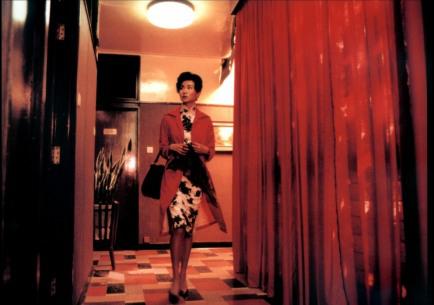I am stopping myself from making the obvious joke, referencing the title of today’s post. So you are spared a horrible pun…for now. Going back to my favorite foreign cinema, I will just group the entire country for now, Asian cinema in particular, for look back at In The Mood For Love. I guess I am stuck on the whole relationship aspect of films. I assure you it’s not that I am going through a breakup or anything, cause you need to be in a relationship first to have a break up. Zing! Alright, bemoaning aside, In The Mood for Love is directed by the wonderful Wong Kar-Wai who just has the perfect pathos to bring us stories about love spanning across gorgeous sets and expansive timeline. It’s a moody love story that brings together a lot of familiar themes, capped with impressive acting from big names like Tony Leung and Maggie Cheung.

Set in a Shanghaiese enclave in Hong Kong in 1962, the film centers on two young couples who rent adjacent rooms in a cramped and crowded tenement. Li-zhen (Maggie Cheung) works as a secretary in an export company while her husband’s job at a Japanese multinational keeps him away on extended business trips. Across the hall, Chow (Tony Leung Chiu-wai) works as a newspaper editor and is married to a woman who is also frequently out of town. Neither respective spouse is ever shown in full, instead they are shot from the back or obscured by walls and furniture. Li-zhen and Chow soon strike up a cordial — if tenative — friendship. Chow begins to suspect that his wife’s long absences are not entirely business related when he stops in unannounced at her office to discover that she is not there. Later, a colleague tells him that he saw his wife with another man. The icing on the cake comes when Chow notices that Li-zhen’s handbag is identical to his wife’s while Li-zhen discovers that Chow is wearing a tie that she gave her husband; it doesn’t take long for them to realize that their spouses are sleeping together. Drawn together by shame and anger, Chow and Li-zhen reveal nothing of their discoveries to their partners. While working through their guilt by imagining how their adulterous spouses first hooked up and rehearsing interrogations, the pair slowly fall in love in spite of their determination to uphold their end of their marital vows. ~ Jonathan Crow, Rovi
A long, complicated, drawn out plot synopsis, but fitting since love is a complicated thing. The thing that makes this truly memorable for me, aside from the excellent story telling that Wong Kar-wai has with all his films, is the color palette and warm romantic feeling that this film has. Warm reds and dark colors bathe the actors in every scene, adding to the somber and quiet nature that they exude during their relationships. The film itself isn’t a warm, fuzzy romance film as the crux of the story hinges on the titular characters spouses copulating with one another. It’s the circumstances that Li and Chow find themselves in that foster a relationship out of the hardship of being faithful, which the films makes some sort of social commentary on if people can really be faithful in the face of adversity.

I liked how the film kind of kept the cheating spouses out of frame or never fully showing who they are. It’s a nice way to keep the emotional connection focused on the two main stars so that their eventual falling into love is significant and meaningful to the viewers. But it’s also a genius way to portray them as not being there, both as an emotional attachment for the characters and also to highlight the secrecy of their cheating. It frames the two dejected lovers as being emotionally cutoff from contact, much like how the audience is also kept from ever really know more about the respective spouses.
Another aspect of the film, used in a lot of Kar-wai’s films is the connection that the characters make to the audience through their stream-of-consciousness monologues that highlight the feelings of the characters. Meaningful dialogue is open to the audience and you get a more intimate look at how the two spouses feel when they don’t have a loved one to share their thoughts. The film does, with the help of the monologues and thought process the characters go through, present this claustrophobic feel to the setting. Not a lot of changes in settings, tight framing and secret interactions acts as a vehicle to push the people closer together, fostering an intimacy that is usually reserved for lovers. It’s a wonderful directing mechanic that Kar-wai uses to get us to focus on the central characters, but also to keep the story tightly wound.
At least, all these things I have brought up about the movie are more so my interpretations of the film. I don’t want to get too much into the story and where it leads, as you should experience the movie for yourself. It’s a gorgeous film with warm visuals and intimate dialogue. The smoldering passion that Leung and Cheung have in the film is only heightened by their jilted circumstances, possibly making the connection even more poignant considering their respective lovers have paired off. If you have not experienced a Wong Kar-wai film, I would definitely recommend this one first, then see Chungking Express.
Advertisement
